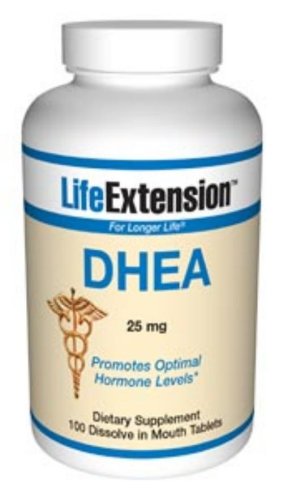DHEA 25mg 100 Capsules
Product Description
In 1981, the Life Extension Foundation introduced DHEA (dehydroepiandrosterone) to its members through an article that described the multiple benefits that this hormone might produce. However, the general public did not learn about DHEA until 1996, when the benefits of DHEA were touted by the news media and in several popular books. DHEA became credible to the medical establishment when the New York Academy of Sciences published a book entitled DHEA and Aging. This book provided scientific validation for the many life extending effects of DHEA. It has been shown that the hormone DHEA often declines 40.8-72.8% by age 70 or later, leading to hormonal imbalances that can affect ones quality of life.1 Peak blood levels of DHEA occur at approximately age 25, decreasing progressively thereafter. Thus, scientists have been looking at ways of restoring DHEA to youthful levels, and are now discovering mechanisms by which this hormone protects against age-related decline.Since 1981, several hundred studies have been published on DHEAs possible benefits. One study investigated immune functions and DHEA using rats as test subjects. The scientists showed that DHEA administration to rats supports specific immune function known to be lacking in the elderly. Another study focused on the various benefits of DHEA supplementation, and noted that DHEAs protective effect could be of benefit to the normal aging brain. Some studies have reported DHEA may improve mood and alleviate melancholy. In fact, as highlighted in two studies, participants have reported that they feel better when taking DHEA.In still another investigative study doctors noted that DHEA is one factor that determines lumbar spine density in aging men. In women, it has been shown that DHEA helps to protect bone mineral density. DHEAs role in supporting a healthy circulatory system and joint/bone health was also highlighted in the Journal of the Medical Association of Thailand.





